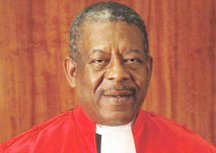(Trinidad Guardian) President of the Criminal Court of Justice Sir Dennis Byron is calling on T&T’s legal fraternity to let their voices to be heard as to why the country has not yet used the court as its final appellate court. Byron was speaking at a luncheon hosted by the Trinidad Union Club at Nicholas Towers, Port-of-Spain, on Tuesday.

“What I am not hearing are the voice of the legal profession in Trinidad. The Bar Association has not made a public statement, I have heard a public statement coming from the Southern Assembly of Lawyers but not from the law society and I think if the civil society should also stand up and speak openly and require the Government to move it should make a significant contribution,” Byron said.
He, however, predicted that by next year T&T’s appeal matters as it related to criminal cases would be heard by the CCJ. Byron said it was also a good time for T&T to “complete the circle of independence” and also enhance access to justice by having final matters heard by the CCJ.
“It is a compromise of sovereignty for us to remain wedded to a court which is part of a former colonial hierarchy. “Trinidad is already a full-fledged member of the court because it has subscribed fully to the court. It has made a financial investment and in addition to that it supports the day-to-day operation of the court in many other ways. What it has not done is delink from the Privy Council and acceded to a final appellate jurisdiction. That obviously is a matter for your government,” Byron said.
He said since the CCJ’s inception in 2005, there were 54 appeals and 52 applications between August 2005 and September 2012. Saying with the CCJ there would be increased access to justice, Byron added, “Litigants can obtain local lawyers, they can even be present when their cases are being heard. Members of the bar in Trinidad and Tobago would benefit in many ways as oppose to the industry of lawyering.”
He said local lawyers would gain from heightened professional development and prestige but they would also have the opportunity to give back to the society. “The lawyers who appear before the CCJ would be better positioned to contribute to the region’s jurisprudence and make a mark on the establishment on the important precedence that would be relied upon regionally and internationally for years to come,” Byron said.
